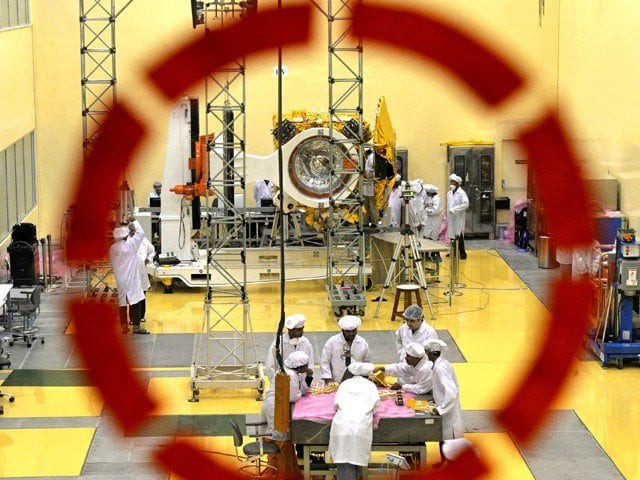Science is booming in our neighbourhood!
Pakistan needs to incentivise Pakistani scientists working abroad to serve even part-time in the country

In this file picture taken on September 11, 2013, scientists and engineers work on
PHOTO:EXPRESS
President Xi Jinping laid out the clear vision for the country on the eve of the 19th National Congress of the Communist Party of China and mentioned major advances in science and technology, including the space lab, deep-sea submarines, modern telescopes, dark matter probe and quantum satellites and the airliner C919. “We will strengthen basic research in applied sciences, launch major national science and technology projects and prioritise innovation in key generic technologies, cutting-edge frontier technologies, modern engineering technologies and disruptive technologies,” said President Xi.
Potential breakthrough in cancer treatment unveiled
We are also good in making tall claims such as turning Pakistan into a knowledge economy but policymakers lack the capacity to devise and implement the right framework to achieve the said goals. This is not the case with China! Look at what the world is saying about Chinese science. An article published in the IFLScience reported, “The statistics formed part of the US National Science Foundation’s (NSF) biennial Scientific and Engineering Indicators Report and, depending on how you look at it, shows that China is on the verge of becoming — or already has become — the planet’s scientific superpower.”
Let’s turn to India’s lunar exploration ambitions. India is all set to launch its Chandrayaan-2 that will include an orbiter, lander and a rover. India is not keeping itself behind in the global race for lunar exploration. After the lunar mission, India has plans to explore other planets. India’s public-sector science research centres have been performing well. Several issues, including cultural factors, still plague Indian performance in science but considering its developing country status, research and development expenditures (as 1% of the GDP) are still quite decent. Though the capable network of Indian Institute of Technology has not left a mark on the research tradition despite their high standard education, India has still outperformed Pakistan in advancement in science and technology which is evident from Indian IT exports of $116 billion in FY-17.
Pakistan need not look far for strategising promotion of scientific research tradition. Our neighbourhood offers great opportunity. There are four takeaway for Pakistan:
Firstly, there should be science collaborations with China and India or at least an exchange of scientific communities across the borders. Chinese scientists are leading publications through collaborations with their US connections. Alongside connectivity through roads under CPEC, Pakistan should also explore China-Pakistan Science Exchange.
Second, there is a need to transform our universities. The Higher Education Commission of Pakistan is in the process of declaring 30 universities research universities, but we need to undertake bold decisions such as Mayor Bloomberg took for New York to invite international universities to establish campuses of cutting-edge education and research. Pakistan should also invite universities from other parts of the world to collaborate with our universities to open joint campuses in Pakistan for science and technology programmes.
Life changing procedures: PIMS surgeons learn metabolic surgery
Third, Pakistan needs to connect its young entrepreneurs to scientists, currently both operating in silos. For growth and advancement in science, entrepreneurs and scientists will have to work together. Entrepreneurs have aspirations and scientists have high-value ideas. Combination of both can make wonders! Recently, I had a brief conversation on this issue with Ehsan Malik, the CEO of Pakistan Business Council, an advocacy forum of leading corporate and business groups in Pakistan. He was of the view, “Scientists and researchers will have to come out of their labs and offices to work closely with business organisations to understand and to help them resolve some pressing scientific and technological challenges.” However, I personally think that Pakistan’s business community has not been playing a significant role in sponsoring research. Leading business groups should also come forward to sponsor research projects in universities. This is essential if Pakistan wants to enter what Alec Ross calls Industries of Future; “robotics, advanced life sciences, the code-ification of money, cybersecurity, and bid data…”
Fourth, Pakistan needs to incentivise Pakistani scientists working abroad to serve even part-time in the country. Their connections abroad and access to modern laboratories will help scientists in Pakistan to get exposed to frontiers of research in science and technology. But we will have to show respect for the talent! This is what China has been doing for long. They have attracted Chinese scientists who were trained abroad and then were approached by the Chinese government to serve in China. Indian scientists serving in the US and UK have also made strong connections with the research community in India. This is what Pakistan also needs to do in the coming days.
Published in The Express Tribune, March 13th, 2018.
Like Opinion & Editorial on Facebook, follow @ETOpEd on Twitter to receive all updates on all our daily pieces.














COMMENTS
Comments are moderated and generally will be posted if they are on-topic and not abusive.
For more information, please see our Comments FAQ